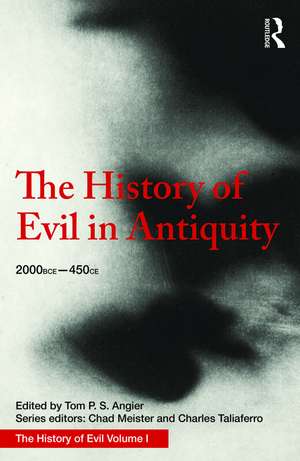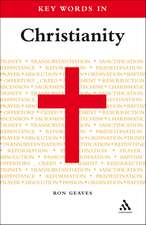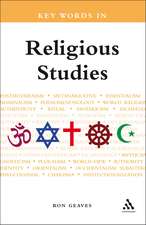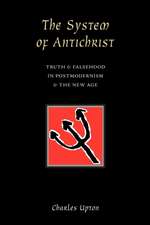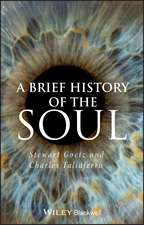The History of Evil in Antiquity: 2000 BCE - 450 CE: History of Evil
Autor Tom Angier, Chad Meister, Charles Taliaferroen Limba Engleză Hardback – 19 iun 2018
Preț: 950.86 lei
Preț vechi: 1159.58 lei
-18% Nou
Puncte Express: 1426
Preț estimativ în valută:
181.94€ • 190.98$ • 151.02£
181.94€ • 190.98$ • 151.02£
Carte tipărită la comandă
Livrare economică 10-24 aprilie
Preluare comenzi: 021 569.72.76
Specificații
ISBN-13: 9781138642300
ISBN-10: 1138642304
Pagini: 322
Dimensiuni: 156 x 234 x 28 mm
Greutate: 0.6 kg
Ediția:1
Editura: Taylor & Francis
Colecția Routledge
Seria History of Evil
Locul publicării:Oxford, United Kingdom
ISBN-10: 1138642304
Pagini: 322
Dimensiuni: 156 x 234 x 28 mm
Greutate: 0.6 kg
Ediția:1
Editura: Taylor & Francis
Colecția Routledge
Seria History of Evil
Locul publicării:Oxford, United Kingdom
Public țintă
UndergraduateCuprins
1. Ancient Israel – Rüdiger Schmitt
2. The Book of Job – Katherine Dell
3. Early Christian Thought – Charles Taliaferro
4. Saint Paul – Timothy Gombis
5. Early Zoroastrian Thought – Jenny Rose
6. Manichaeism – Michael Mendelson
7. The Gnostics – Giovanni Filoramo
8. The Presocratics – Vicki L. Harper
9. Socrates and Plato – Sophie Grace Chappell
10. Aristotle – Tom Angier
11. Epicureanism – Thomas A. Blackson
12. The Stoics – John Sellars
13. Scepticism – Richard Bett
14. Neoplatonism – Kevin Corrigan
15. Philo of Alexandria – Marian Hillar
16. Evil in Graeco-Roman Religion and Literature – Rocki Wentzel
17. Vedas and Upanisads – Shyam Ranganathan
18. Buddhism – Peter Harvey
19. Ancient China – Randall L. Nadeau
20. Representations of Evil – Dale Jacquette
2. The Book of Job – Katherine Dell
3. Early Christian Thought – Charles Taliaferro
4. Saint Paul – Timothy Gombis
5. Early Zoroastrian Thought – Jenny Rose
6. Manichaeism – Michael Mendelson
7. The Gnostics – Giovanni Filoramo
8. The Presocratics – Vicki L. Harper
9. Socrates and Plato – Sophie Grace Chappell
10. Aristotle – Tom Angier
11. Epicureanism – Thomas A. Blackson
12. The Stoics – John Sellars
13. Scepticism – Richard Bett
14. Neoplatonism – Kevin Corrigan
15. Philo of Alexandria – Marian Hillar
16. Evil in Graeco-Roman Religion and Literature – Rocki Wentzel
17. Vedas and Upanisads – Shyam Ranganathan
18. Buddhism – Peter Harvey
19. Ancient China – Randall L. Nadeau
20. Representations of Evil – Dale Jacquette
Notă biografică
Tom P. S. Angier is Lecturer in Philosophy at the University of Cape Town, South Africa.
Chad Meister is Professor of Philosophy and Theology at Bethel College, USA.
Charles Taliaferro is Professor of Philosophy at St Olaf College, USA.
Chad Meister is Professor of Philosophy and Theology at Bethel College, USA.
Charles Taliaferro is Professor of Philosophy at St Olaf College, USA.
Recenzii
"The History of Evil in Antiquity would be a very useful volume to employ in a college course on the problem of evil. It should also prove of great interest to the many members of the general public who wrestle with the tension between the claim that the world is rooted in divine goodness and the existence of obvious and often horrendous evils."
William J. Wainwright, University of Wisconsin-Milwaukee, USA
"Evil is a problem for everybody. As contributors to this book show, it's always been a problem. But explaining evil—its sources, what to do about it, who is to blame, and God's relation to it—has been done in various ways. These essays provide historical perspectives and explanatory options. Ironically, it's good to have this evil book!"
Thomas Jay Oord, author of The Uncontrolling Love of God
"We think we know what evil is, since we've all had some experience with the subject. Yet it has been understood in very different ways across various cultures and times. The History of Evil series bids fair to deepen our grasp of how various, and how variously conceived, evil is. The diversity examined in this first volume of the series is already enough to raise the fundamental question of whether we're really talking about the same thing when we talk about conceptions of evil in West and East, antiquity and modernity. It's a mind-expanding volume."
Phillip Cary, Eastern University, USA
William J. Wainwright, University of Wisconsin-Milwaukee, USA
"Evil is a problem for everybody. As contributors to this book show, it's always been a problem. But explaining evil—its sources, what to do about it, who is to blame, and God's relation to it—has been done in various ways. These essays provide historical perspectives and explanatory options. Ironically, it's good to have this evil book!"
Thomas Jay Oord, author of The Uncontrolling Love of God
"We think we know what evil is, since we've all had some experience with the subject. Yet it has been understood in very different ways across various cultures and times. The History of Evil series bids fair to deepen our grasp of how various, and how variously conceived, evil is. The diversity examined in this first volume of the series is already enough to raise the fundamental question of whether we're really talking about the same thing when we talk about conceptions of evil in West and East, antiquity and modernity. It's a mind-expanding volume."
Phillip Cary, Eastern University, USA
Descriere
This first volume of The History of Evil will appeal to those with particular interests in the ancient period as well as those seeking an understanding of how later philosophical and religious developments were conditioned and shaped.
